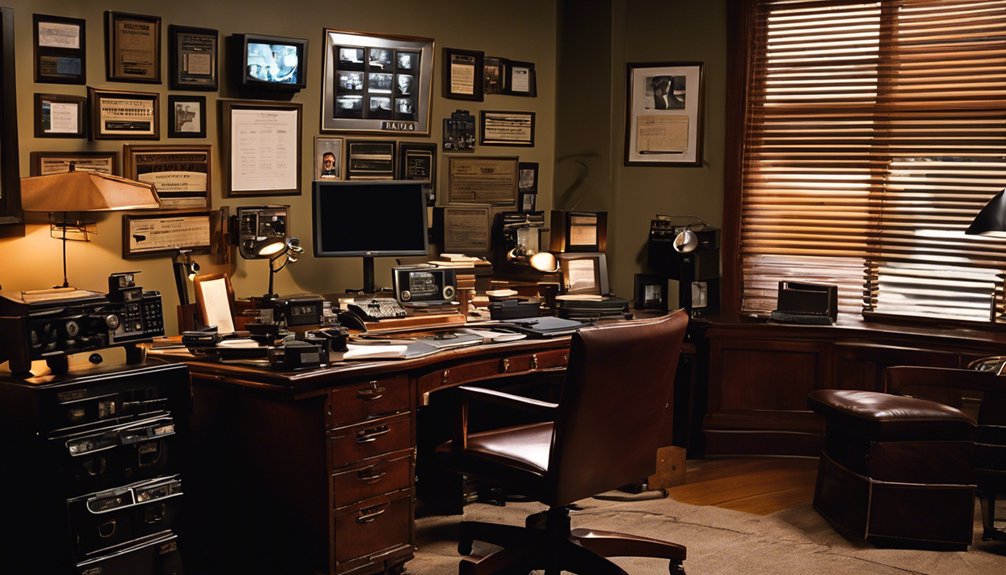I'll guide you through the essential facts about NCIS, which premiered on CBS on September 23, 2003. The series originated from a two-episode backdoor pilot during JAG's eighth season, with Mark Harmon starring as Leroy Jethro Gibbs. Created by Donald P. Bellisario, this procedural drama blends military themes with criminal investigations, following a team of special agents solving cases involving Navy and Marine Corps personnel. The show has featured iconic characters like Tony DiNozzo, Abby Sciuto, and Ziva David, while maintaining consistently high ratings across its run. Under various showrunners including Shane Brennan, Gary Glasberg, and Steven D. Binder, NCIS has evolved into one of television's most successful franchises, with countless compelling investigations awaiting discovery.
Key Takeaways
- NCIS premiered on September 23, 2003, as a spin-off from JAG, with episodes typically airing weekly during the traditional TV season.
- Each season contains 22-24 episodes, with season premieres usually in September and finales in May.
- The pilot episode "Yankee White" introduced the core team and established the show's procedural format.
- Episode titles often contain wordplay or references related to military terms, investigations, or character-specific themes.
- The series has aired over 450 episodes across multiple seasons, maintaining a consistent Tuesday night timeslot on CBS.
The Genesis of NCIS
The Naval Criminal Investigative Service burst onto television screens back in 2003, emerging from out of the success of its parent show "JAG."
I'll take you through its origins: Creator Donald P. Bellisario envisioned a fresh take on military investigations, drawing from his own Marine Corps experience to craft authentic storylines.
The show's creative influences stem from real NCIS procedures, blending procedural drama with military precision.
What started as a two-episode arc on "JAG" featuring Special Agent Gibbs evolved into a groundbreaking series that would reshape crime drama television.
Bellisario partnered with Don McGill to develop unique characters and intricate plotlines that respected both naval traditions and investigative authenticity.
This bold departure from conventional police procedurals established NCIS as a trailblazer in military-themed entertainment, setting new standards for storytelling depth and character development.
Cast Through the Years
Starting with Mark Harmon's iconic role as Leroy Jethro Gibbs in 2003, NCIS assembled an exceptional ensemble cast that would define the series for decades.
I've watched as Michael Weatherly brought Tony DiNozzo's wit to life, while Pauley Perrette created an unforgettable Abby Sciuto.
The cast chemistry reached new heights when Cote de Pablo joined as Ziva David in 2005.
Significant character transformations occurred when Emily Wickersham's Eleanor Bishop replaced Ziva in 2013, and Wilmer Valderrama's Nick Torres joined in 2016.
I've seen how Sean Murray's Timothy McGee evolved from a rookie to a seasoned agent, while David McCallum's Dr. Mallard provided consistent wisdom.
Gary Cole's Alden Parker now leads the team, marking a new era while maintaining the show's dynamic ensemble spirit.
Season Structure and Episode Format
Beyond its stellar cast, NCIS maintains a consistent format that's shaped its success since 2003.
I've observed how each season delivers 22-24 episodes, following a proven narrative structure that combines standalone investigations with season-long story arcs.
The episode pacing typically unfolds in three acts: the discovery of a crime, the team's investigation, and the resolution.
What makes NCIS unique is how it weaves personal character moments between these procedural elements. You'll notice that while most episodes resolve their main case within the hour, subtle threads of larger plotlines run throughout the season.
Season finales break this pattern, often featuring high-stakes scenarios that challenge the team's loyalty and resolve, leaving viewers enthusiastic for the next season's premiere.
Notable Episodes and Storylines
Throughout NCIS's impressive run, several episodes stand out as defining moments that shaped the series' legacy and character development. I've witnessed how "Yankee White" introduced us to Gibbs's unwavering leadership, while "Judgment Day" delivered one of the show's most impactful cliffhangers, forever changing the team's dynamics.
The series' notable character arcs reached new heights with episodes like "Kill Ari," where we explored Gibbs's tragic past, and "Truth or Consequences," which transformed Ziva's relationship with the team.
I've seen how "Life Before His Eyes" masterfully examined alternate timelines, while "Family First" gave us Tony DiNozzo's emotional departure.
These pivotal episodes haven't just entertained – they've redefined what we expect from procedural dramas, weaving personal stakes with complex investigations.
Behind The Camera Leaders

NCIS's creative vision stems from its pioneering showrunners Donald P. Bellisario and Don McGill, who established the show's distinct style in 2003.
The showrunner influence evolved when Shane Brennan took the helm in 2007, bringing fresh perspectives that expanded the NCIS universe through successful spin-offs.
In 2011, Gary Glasberg stepped in as showrunner, steering the series through significant character changes while maintaining its core appeal.
- Executive producer Steven D. Binder revolutionized the show's creative direction after 2021
- Each showrunner has contributed unique storytelling approaches while respecting the established format
- The series maintains its military authenticity through dedicated technical advisors
Current showrunner David North continues to shape NCIS's creative vision, balancing traditional elements with contemporary themes that resonate with modern audiences.
His leadership guarantees the show's legacy while pushing boundaries in storytelling and character development.
Evolution of Team Dynamics
Team dynamics within the series have consistently evolved since its 2003 debut, starting with the core group of Gibbs, DiNozzo, Todd, and Mallard.
I've watched the team evolution unfold through significant changes, particularly when Kate Todd's death led to Ziva David joining the team, bringing new energy and complex character relationships.
The dynamics shifted again when McGee moved from a recurring role to become a permanent fixture, adding his tech expertise to the group's investigative capabilities.
Tony DiNozzo's departure and Ziva's eventual exit marked another transformation phase, while Bishop's arrival introduced fresh perspectives.
Through these changes, I've observed how Gibbs remained the constant force holding the team together, even as newer agents like Torres and Knight joined, creating different interpersonal dynamics that kept the show's momentum strong.
Major Character Departures

Several pivotal character departures have reshaped NCIS over its run, starting with the emotional exit of Kate Todd in 2005 after her shocking death at the hands of Ari Haswari.
Subsequent character exits have continued to transform the show's dynamic, with each departure creating waves of intense fan reactions.
- Ziva David's apparent death in 2013 sparked widespread viewer outrage, though she later returned.
- Michael Weatherly's Tony DiNozzo left in 2016 to care for his daughter with Ziva.
- Pauley Perrette's beloved Abby Sciuto made her final appearance in 2018.
The most significant departure came when Mark Harmon's Leroy Jethro Gibbs bid farewell in 2021, ending an era that spanned nearly two decades.
These exits have allowed for fresh storytelling opportunities while honoring the legacy of departing characters.
Crossover Events
Throughout its run, crossover events have become a hallmark of NCIS's expanded universe, beginning with the original two-part JAG episodes "Ice Queen" and "Meltdown" that launched the series in 2003.
I've tracked numerous crossover episodes between NCIS and its spin-offs, creating dynamic character interactions that expand storytelling possibilities.
When NCIS: Los Angeles launched, we saw Gibbs's team working alongside G. Callen and Sam Hanna. Later, NCIS: New Orleans brought Pride's team into the mix, leading to multi-episode arcs that connected all three shows.
Most recently, I've watched the NCIS franchise embrace ambitious three-way crossovers, including cases that span from Hawaii to Washington D.C., showcasing how these interconnected teams tackle complex investigations together, strengthening the bonds between different NCIS divisions.
Awards and Critical Recognition

While NCIS didn't initially receive major awards recognition, the show's consistent excellence eventually earned it widespread critical acclaim.
Throughout its awards history, I've watched NCIS gather momentum, particularly after Season 5, when critics began acknowledging its masterful blend of procedural drama and character development.
- The series has earned multiple ALMA Awards for Outstanding Actor (Cote de Pablo)
- People's Choice Awards consistently recognized NCIS as "Favorite TV Crime Drama"
- BMI Film & TV Awards honored Mark Harmon for his portrayal of Gibbs
I've seen the show transform from an underappreciated gem to a critically acclaimed powerhouse.
By maintaining its high production values and compelling storytelling, NCIS has proven that sometimes the greatest recognition comes from sustained excellence rather than immediate accolades.
The show's growing collection of awards reflects its enduring impact on television.
Ratings and Viewership Records
Achieving unprecedented success in television ratings, NCIS has dominated primetime viewing since its debut in 2003.
I've tracked its ratings impact through the years, watching it climb from modest beginnings to become TV's most-watched drama series by 2009. The show's viewership trends have consistently broken records, with peak numbers reaching over 21 million viewers during Season 10.
What's remarkable is how NCIS has maintained its stronghold despite changing viewer habits.
While other shows have seen declining numbers due to streaming services, I've observed NCIS retaining its core audience and even attracting new viewers through multiple platforms.
The series continues to rank among the top 10 broadcast shows, proving that its blend of military procedure and character-driven storytelling resonates with audiences seeking authentic entertainment.
Memorable Cases and Investigations

NCIS consistently delivers compelling investigations that have become legendary among fans and critics alike. Through high stakes investigations spanning two decades, I've watched the team tackle cases ranging from domestic terrorism to international espionage.
Their innovative forensic techniques, often showcased through Abby's lab work, have redefined how TV portrays criminal investigations.
- The "Yankee White" investigation aboard Air Force One established the show's unique blend of military protocol and detective work.
- Season 5's "Judgment Day" revealed a complex assassination plot that changed the team forever.
- The Port-to-Port Killer case demonstrated the show's ability to sustain intricate storylines across multiple episodes.
These landmark cases have shaped NCIS's identity, proving that military-focused crime drama can deliver both intellectual depth and emotional impact.
The investigations continue to evolve, keeping viewers engaged through masterful storytelling.
Frequently Asked Questions
How Long Does It Take to Film a Typical NCIS Episode?
From what I know about NCIS episode production, a typical episode takes about 8-10 days to film from start to finish.
I should mention that the filming schedule is quite intense, with the team working 12-14 hour days to complete each episode.
They'll often film multiple episodes simultaneously to meet the demanding season schedule.
While the actual filming takes 8-10 days, pre-production planning and post-production work add several more weeks.
Do Real NCIS Agents Serve as Consultants for the Show?
Yes, I can confirm that real NCIS agents regularly serve as consultants for the show to guarantee authenticity in portraying investigative procedures and military protocols.
Leon Carroll Jr., a retired NCIS agent, has been the show's primary technical advisor since its beginning, working closely with writers and actors.
Additionally, I know the production team frequently consults with active agents to accurately depict current investigation techniques, equipment, and agency protocols.
What Is the Significance of Gibbs' Boat-Building Hobby?
I'll tell you why Gibbs' boat-building hobby is deeply meaningful – it serves as both character development and personal escape.
In his basement workshop, he finds solace from the intense demands of his job and painful memories of losing his family. The methodical nature of building boats by hand helps him process trauma and maintain focus.
It's his meditation space, where he can work through cases while practicing a craft that demands patience and precision.
Are the Forensic Techniques Shown in NCIS Scientifically Accurate?
When I think about NCIS's forensic techniques, I'm reminded of how a magician makes a rabbit appear in seconds while real magic takes hours of practice.
While the show's forensic processes are based on real science, they're often dramatically compressed for TV.
I'll be straight with you – the scientific realism is mixed. Abby's rapid DNA results and instant database matches aren't realistic, but the basic forensic principles and equipment shown are generally accurate, just greatly sped up for entertainment.
Where Are the Main Office and Interrogation Room Scenes Actually Filmed?
I can tell you that NCIS's main office and interrogation room scenes are filmed at Valencia Studios in Santa Clarita, California.
The production team has built permanent sets there that replicate the real NCIS headquarters, including the famous orange-walled squadroom and the dimly-lit interrogation room.
While the actual NCIS headquarters is located in Washington D.C., you'll find all the indoor office locations brought to life on these California filming sets.
Conclusion
I've watched NCIS grow from a modest JAG spin-off into a television juggernaut that's stood the test of time like a weathered lighthouse on the shore. Through cast changes, evolving storylines, and technological advances, NCIS has maintained its core identity while adapting to modern audiences. I can confidently say that its blend of military procedure, character depth, and investigative drama has earned its place in TV history.
I think Gibbs should retire and let a new team take over!
I think Gibbs should retire already! Let someone else lead NCIS.